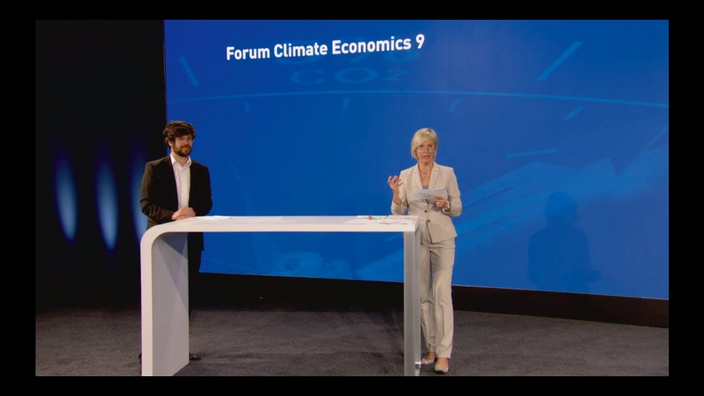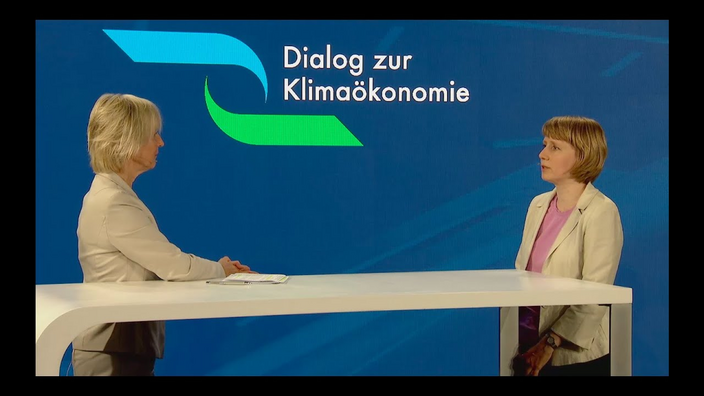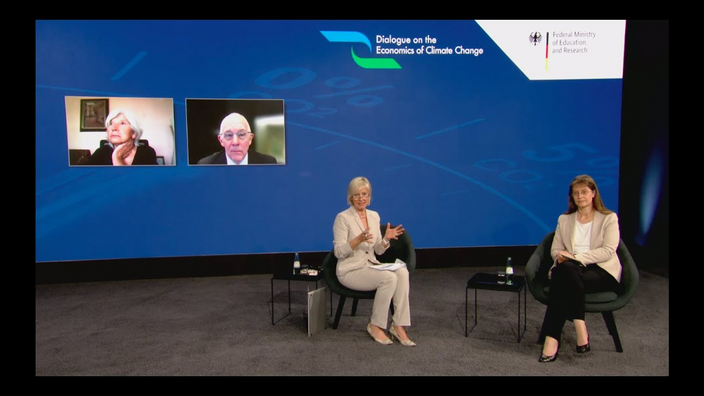Forum Climate Economics 9
Increasing Global Climate Ambition – How to get Lower-Income Countries and Fossil Fuel Exporters on Board?
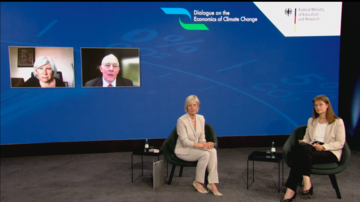
Under the title "Increasing Global Climate Ambition", the Forum Climate Economics 9 took place for the first time in English on June 22, 2021. Together with keynote speakers Laurence Tubiana and Adam Sieminski, who joined the event from Paris and Riyadh, respectively, the moderators and researchers in the studio discussed how developing countries and resource-rich fossil-fuel exporters can increase their ambitions in climate policy. About 150 participants in the audience from politics, the private sector, civil society and academia watched the 2.5-hour event via live stream. Between the U.S. government's return to the Paris Agreement on the one hand and a rather unambitious final declaration by the G7 countries on the other, the forum was well-timed: International cooperation to increase climate ambition remains a tough challenge, especially in light of the disruptions caused by the Corona pandemic.
Adam Sieminski opens with keynote address on the perspective of oil-exporting countries
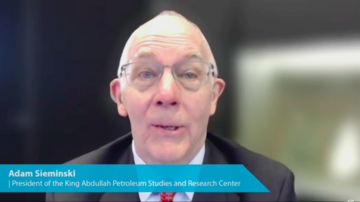
The first keynote was delivered by Adam Sieminski, president of the King Abdullah Petroleum Studies and Research Center (KAPSARC) in Riyadh. He warned against demonizing fossil fuels in international climate negotiations. In low-income countries and emerging economies in particular, he argued, access to modern electricity has a higher priority. Thus, when talking about climate policy in these regions there is a risk of getting lost in debates about climate justice and of reaching a dead-end. Also, there are no concepts for many sectors on how to do without fossil fuels. However, Saudi Arabia, as the world's largest oil producer, has recognized the need for action and is pursuing the concept of the Circular Carbon Economy (CCE), which Sieminski presented. It aims for net-zero emissions instead of zero fossil use. At the recent summit meeting on climate protection called by U.S. President Biden, the U.S., Canada, Saudi Arabia, Qatar and Norway joined forces to form the "Net-zero Producers Forum". Among other things, they want to promote the CCE approach.
Sieminski emphasized that regardless of the highly diverse contexts in emerging and developing countries, capital is needed everywhere to tackle the energy transition and achieve both clean energy access for all (SDG 7) and climate protection (SDG 13). Political, regulatory, administrative, and organizational capacities are key factors for successfully mobilizing capital and investing in clean energy projects
Laurence Tubiana: International solidarity is needed to overcome the challenges of the Covid-19 pandemic and to raise climate policy ambitions!

The second keynote was delivered by Laurence Tubiana, Executive Director of the European Climate Foundation (ECF) and Chair of the Board of the French Development Agency (AFD). She stressed that the impacts of climate change and the Covid-19 pandemic will hit the poorest countries hardest. They do not have the means to address the economic and social challenges and the climate policy goals at the same time. Covid-19, she noted, requires a solidarity-based response from countries that are financially and technologically able to do so. Tubiana sees short-term international cooperation to address the pandemic – including, in particular, vaccination of the population – as a prerequisite for these countries' willingness to increase their climate policy ambition. Furthermore, she pointed out, there is a lack of financial support for lower-income countries to enter 1.5°-compatible pathways.
In the short term, the reallocation of IMF special drawing rights could increase the liquidity of low- and middle-income countries (LMICs). In the longer run, the international debt architecture would need to be reformed to take into account the long-term effects of climate change and the risks posed by extreme weather events. According to Tubiana, the IMF could create the conditions for a green, inclusive, and just recovery in LMICs by reconceptualizing its role. She added that likewise, development banks and climate funds would be ready to do so, but they need a clear mandate.
Panel discusses requirements and challenges of the global energy transition from the perspective of LMICs and fossil-resource rich countries
Moderated by Conny Czymoch and Christine Merk (IfW), Karen Pittel (ifo Institute Munich), Laurence Tubiana, and Adam Sieminski discussed about "Transforming Lower-Income Countries and Resource-Rich Economies – Challenges, Choices, and Chances". Two expert inputs provided the background for the discussion. Jan Steckel (MCC Berlin) and Franziska Holz (DIW Berlin) reported on the topics and results from the virtual roundtables on June 8 and 10 that preceded the Forum:
Capital Markets, Institutions, and Distributional Effects – Towards Ambitious Climate Policy for Low- and Middle-Income Countrie
On June 8, 2021, at the first roundtable Kevin Urama (African Development Bank), Anna-Katharina Hornidge (German Development Institute) and Silvia Kreibiehl (Frankfurt School of Finance and Management) discussed challenges that LMICs in particular face in increasing their climate policy ambitions. Waldemar Marz (ifo Institute) moderated the event and Jan Steckel carried its insights into the discussion at the forum.
Steckel emphasized the need to frame climate policy as development policy and outlined three challenges for low- and middle-income countries:
- Public institutions must be enabled to execute climate policy – they need the regulatory, administrative, and organizational capacities to implement social and climate policy.
- Renewable energies are more capital intensive than fossil, making high capital costs more of an issue here. In order for renewables to be competitive, there is a need for lower capital costs, a stable policy environment, and additional skills and technological capabilities to operate the plants effectively.
- Implicitly, the policy measures to achieve the Sustainable Development Goals (SDG) compete with each other are weighed against each other. In the Global South, the goals "No poverty" and "Affordable and Clean Energy" are prioritized over climate protection.
Steckel concluded that these circumstances make it all the more important to link the challenges posed by climate change to economic and social development to overcome conflicts of interest.
Beyond Fuel Exports – Perspectives for a Transition of Fossil-Resource Rich Countries to Ambitious Climate Policy
The second roundtable, held on June 10, 2021, focused on the prospects for increasing the climate policy ambitions of countries whose economic model is based on the export of fossil fuels. The roundtable, which included contributions from Clare Murray (2° Investing Initiative) and Ali Al-Saffar (International Energy Agency), was moderated by Franziska Holz (DIW Berlin), who also presented the main insights from the discussion at the Forum:
- Fossil-resource rich countries on average show less ambition regarding climate policy. The revenues from fossil resources determine a large share of the Gross Domestic Product (GDP), the employment in the countries, and the government budgets. Thus, international climate policy and the imminent decline in the demand for fossil fuels threaten these countries’ business models.
- Economic diversification is one strategy for overcoming the dependence on fossil resources and thus on the volatility of international resource markets. However, the necessary investment in alternative sectors poses a major challenge: Public investment of the resource revenues often fails due to institutional capacities. Private investors require stable political and regulatory conditions, and institutional investors are often not allowed to invest in so-called high-risk countries at all. Investments in the energy sector, e.g. in hydrogen or renewables, would be an easy option and could prevent asset stranding, but they have much lower profit margins than fossil energies.
- There is no simple solution to reduce the dependence on fossil fuels and thus increase climate policy ambitions. The international climate negotiations must recognize these countries’ strong dependence on the revenues from resource exports and consider adequate compensation mechanisms.
Topics: Green Deal diplomacy, climate finance, CBAM, strategies on the road to net-zero
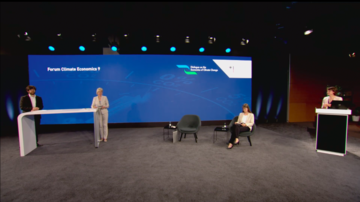
The discussion showed how important it is to look beyond the borders of the European Union. When considering the Green Deal, there also needs to be a greater focus on the impact on other regions. Europe should move from a climate diplomacy to a Green Deal diplomacy that emphasizes that the shift to a Green Economy is worthwhile, and that such a transition also contributes to other SDGs. The EU should integrate climate policy in economic and social development policy.
The panel unanimously agreed on the crucial role of climate finance for raising the ambitions. Currently, the available funds are still insufficient. In addition, there is uncertainty about whether the capacity to absorb the funds in these countries exists at all. Investments were highlighted as the key factor for the transition: Most investments will have to come from private sources, but the capital costs are still very high because of the high risk premiums. The panel concluded that much remains to be done to ensure that rich countries in the Global North support such investments.
The discussion encouraged a change of perspective: If one removes the EU Green Deal lens, it becomes apparent that the planned Carbon Border Adjustment Mechanism (CBAM) can have negative effects on countries in the Global South and that alternative measures would be better from their point of view. Solutions from the scientific community were also put to the test in terms of practical feasibility: compensation payments for resource owners for leaving their fossil resources in the ground have proven to be politically unfeasible. This gives the scientific community the task of developing alternative approaches, such as payments that are conditional.
There was disagreement about risk management on the path to carbon neutrality: the priorities Adam Sieminski set for weighting the CCE’s 4Rs (reduce, reuse, recycle, remove) to reach carbon neutrality were contentious. Opposing views came from the other panelists and the online audience, who participated actively via chat: they wanted to prioritize reducing emissions more strongly. The discussion at the Forum thus illustrated the main issues and different positions in international climate policy clearly.
